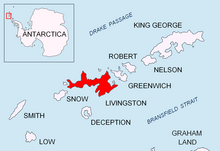Leslie Hill (62°34′S 60°12′W / 62.567°S 60.200°W) is a hill lying northward of Bowles Ridge and south of the Vidin Heights in the eastern part of Livingston Island in the South Shetland Islands, Antarctica. Situated 5.33 km (3.31 mi) north of Mount Bowles, 1.43 km (0.89 mi) east-northeast of the summit of Gleaner Heights and 3.15 km (1.96 mi) south-southwest of Radnevo Peak.
| Leslie Hill | |
|---|---|
 Leslie Hill from Miziya Peak, with Radnevo Peak and Zemen Knoll in the foreground and Burdick Ridge in the background. | |
| Naming | |
| Etymology | David Leslie, master of the whaler Gleaner |
| Geography | |
| Continent | Antarctica |
| Island | Livingston Island, South Shetland Islands |
| Range coordinates | 62°34′S 60°12′W / 62.567°S 60.200°W |


The hill was named by the UK Antarctic Place-Names Committee in 1958 for David Leslie, Master of the American brig Gleaner, a whaler from New Bedford, Massachusetts, which was diverted to sealing in 1820–21 in the South Shetland Islands, following the discovery of this group.[1][2]
See also
editMaps
edit- L.L. Ivanov et al. Antarctica: Livingston Island and Greenwich Island, South Shetland Islands. Scale 1:100000 topographic map. Sofia: Antarctic Place-names Commission of Bulgaria, 2005.
- L.L. Ivanov. Antarctica: Livingston Island and Greenwich, Robert, Snow and Smith Islands. Scale 1:120000 topographic map. Troyan: Manfred Wörner Foundation, 2009.
- L.L. Ivanov. Antarctica: Livingston Island and Smith Island. Scale 1:100000 topographic map. Manfred Wörner Foundation, 2017. ISBN 978-619-90008-3-0
- A. Kamburov and L. Ivanov. Bowles Ridge and Central Tangra Mountains: Livingston Island, Antarctica. Scale 1:25000 map. Sofia: Manfred Wörner Foundation, 2023. ISBN 978-619-90008-6-1
References
edit- ^ "Leslie Hill". Geographic Names Information System. United States Geological Survey, United States Department of the Interior. Retrieved 2013-06-11.
- ^ Alberts, Fred G., ed. (June 1995). Geographic Names of the Antarctic (PDF) (second ed.). United States Board on Geographic Names. p. 429. Retrieved 2012-04-05.
This article incorporates public domain material from "Leslie Hill". Geographic Names Information System. United States Geological Survey.
